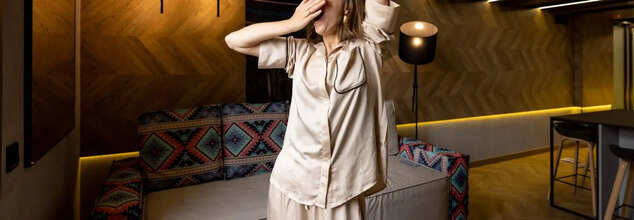
Credit: Canva
Smart Pajamas Can Now Detect Sleep Disorders at Home
Measuring the quality and quantity of your sleep could be tricky. Traditional sleep monitoring methods, like polysomnography (PSG), require an overnight stay in a clinic, bulky equipment, and uncomfortable adhesive patches. However, researchers have now developed a game-changing alternative—Smart pyjamas. They are comfortable, washable and do not require any sort of intrusive wiring being attached to the body.
Poor Sleep Has Serious Repercussions
"Poor sleep has huge effects on our physical and mental health, which is why proper sleep monitoring is vital," said Luigi Occhipinti, a professor at the University of Cambridge and lead researcher on the project. "However, the current gold standard, polysomnography, is expensive, complicated, and is not suitable for long-term home use."Although at-home sleep tests and wearable devices exist, they often have limitations. Many focus on a single condition and can be cumbersome, while smartwatches and fitness trackers rely on indirect metrics that lack clinical accuracy. "We need something that is comfortable and easy to use every night but accurate enough to provide meaningful insights into sleep quality," Occhipinti emphasized.
How Do These Sleep Pyjamas Function?
Building on previous research with a smart choker designed for speech-impaired individuals, the researchers developed fabric-based sensors that detect subtle skin movements. These sensors, integrated into the pyjamas, monitor breathing patterns even when worn loosely around the neck and chest. The team also created a machine-learning model called SleepNet, which interprets the data collected by the sensors to classify six different sleep states: nasal breathing, mouth breathing, snoring, teeth grinding, central sleep apnea, and obstructive sleep apnea. When tested on individuals with and without sleep apnea, the smart pyjamas demonstrated a remarkable accuracy rate of 98.6%.
These Pyjamas Also Have Data Transmission
To enhance usability, the researchers engineered the sensors for durability, employing a special starching process that ensures they remain functional even after multiple washes. Additionally, the latest version of the pyjamas features wireless data transmission, allowing users to securely send sleep data to their smartphones or computers. "Sleep is so important to health, and reliable sleep monitoring can be key in preventative care. Since this garment can be used at home rather than in a hospital, it can alert users to potential sleep issues, which they can then discuss with their doctor," he said.
Beyond sleep monitoring, the research team is exploring broader applications for their fabric sensors. This could include tracking other health conditions and even baby monitoring. They are also working to improve the sensors' durability for long-term use.
Sleep Deprivation Hampers Everyday Functioning
Sleep deprivation is a growing public health concern, with over a third of US adults reporting less than the recommended seven hours of sleep per night. In the short term, insufficient sleep affects mood, judgment, and memory while increasing the risk of accidents and injuries. The economic impact is just as severe—sleep deprivation is linked to an estimated $44 billion in lost productivity annually. Furthermore, chronic sleep loss disrupts appetite-regulating hormones, leading to increased cravings for high-calorie, fatty, and sugary foods.© 2024 Bennett, Coleman & Company Limited

